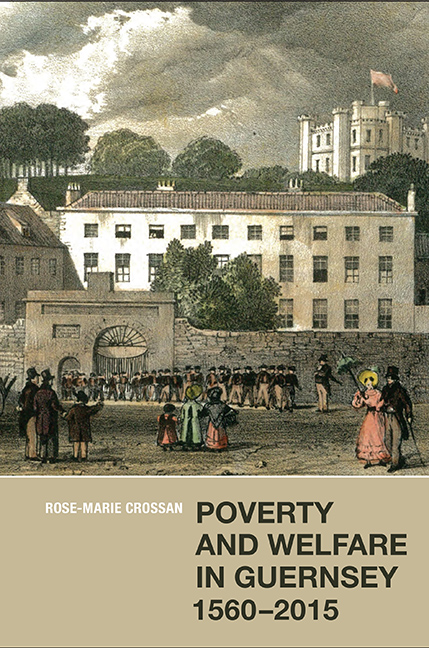Book contents
- Frontmatter
- Dedication
- Contents
- List of Illustrations
- Acknowledgements
- Abbreviations
- Conventions, Note on curren
- Maps
- Introduction
- I Context
- II Welfare
- III Town Hospital
- IV Twentieth Century and Beyond
- Conclusion
- Appendix 1 Writings on Peasant Proprietorship in Guernsey
- Appendix 2 Poor Rates, Indoor and Outdoor Relief Spending, St Peter Port, 1724–1924
- Appendix 3 Parochial Poor Relief in Other Channel Islands
- Appendix 4 Average Year-end Head-counts and Average Annual Admissions and Discharges, Town Hospital, 1700s–1900s
- Appendix 5 Adult Admissions Ascribed to Illness and Accidents, Town Hospital, 1852–1919
- Appendix 6 Relative Proportions of Men and Women in Year-end Head-counts and Annual Admissions, Town Hospital, 1750–1919
- Appendix 7 Annual Averages of Child Admissions and Year-end Numbers, Town Hospital, 1756–1919
- Appendix 8 Over-60s as a Proportion of all Inmates, and Composition by Sex of Over-60s Cohort, Town Hospital, 1756–1911
- Appendix 9 Average Weekly Amounts Purchased per Head, Town Hospital, 1760–1917
- Appendix 10 Timeline: Developments in Poor Relief and Social Security, 1700–2010
- Bibliography
- Index
Appendix 1 - Writings on Peasant Proprietorship in Guernsey
Published online by Cambridge University Press: 18 June 2021
- Frontmatter
- Dedication
- Contents
- List of Illustrations
- Acknowledgements
- Abbreviations
- Conventions, Note on curren
- Maps
- Introduction
- I Context
- II Welfare
- III Town Hospital
- IV Twentieth Century and Beyond
- Conclusion
- Appendix 1 Writings on Peasant Proprietorship in Guernsey
- Appendix 2 Poor Rates, Indoor and Outdoor Relief Spending, St Peter Port, 1724–1924
- Appendix 3 Parochial Poor Relief in Other Channel Islands
- Appendix 4 Average Year-end Head-counts and Average Annual Admissions and Discharges, Town Hospital, 1700s–1900s
- Appendix 5 Adult Admissions Ascribed to Illness and Accidents, Town Hospital, 1852–1919
- Appendix 6 Relative Proportions of Men and Women in Year-end Head-counts and Annual Admissions, Town Hospital, 1750–1919
- Appendix 7 Annual Averages of Child Admissions and Year-end Numbers, Town Hospital, 1756–1919
- Appendix 8 Over-60s as a Proportion of all Inmates, and Composition by Sex of Over-60s Cohort, Town Hospital, 1756–1911
- Appendix 9 Average Weekly Amounts Purchased per Head, Town Hospital, 1760–1917
- Appendix 10 Timeline: Developments in Poor Relief and Social Security, 1700–2010
- Bibliography
- Index
Summary
Daniel De Lisle Brock, Bailiff of Guernsey 1821–42, was proud of Guernsey's distinctiveness and always happy to furnish enquirers with particulars of its unique regime. During the 1820s, he supplied information of this sort to two young men who went on to make use of it in their own publications. The first was Robert Montgomery Martin, whom Brock met in London while on States’ business in 1821. The second was Frederic Hill, with whom Brock became acquainted when Hill visited Guernsey in 1826. Hill used material supplied by Brock in an article for the London Examiner published in September 1832 which was subsequently reproduced in several other periodicals. Hill's article focused on the benefits of Guernsey's widely diffused landownership, contending that this resulted in increased crop yields, a spirit of self-reliance and an absence of pauperism. In 1835, Robert Montgomery Martin’s five-volume History of the British Colonies appeared. In his section on Guernsey in the fifth volume, he vaunted the advantages of the insular land tenure system in a similar way to Hill, going so far as to assert that there were ‘no poor laws, and no paupers requiring relief ‘. His closing paragraph speculated on how the introduction of a system such as Guernsey's might palliate ‘the poverty and barbarism of the Irish’. Dublin-born Martin had already published two books on the problems of his native country, and the theme of Irish poverty was very much a live one at the time he wrote his piece on Guernsey. During the 1820s, there had been an outpouring of pamphlet literature on the subject, stimulated in particular by the Irish potato crop failure of 1823 and the rural disturbances of 1825. The problem was felt to lie in the monopoly of land by a small and often exploitative class of proprietors, a situation which condemned most rurals to live as labourers, often solely in return for the produce of plots held from their employers. Press interest in Ireland continued throughout the 1830s, sustained by the appointment in 1833 of the Royal Commission on the Condition of the Poorer Classes in Ireland, the publication of its report in 1836 and the introduction in 1838 of a new poor law for Ireland.
The ‘Irish problem’ struck a chord with Jonathan Duncan, an English writer and businessman resident in Guernsey between the 1820s and 1840s.
- Type
- Chapter
- Information
- Poverty and Welfare in Guernsey, 1560-2015 , pp. 275 - 278Publisher: Boydell & BrewerPrint publication year: 2015



